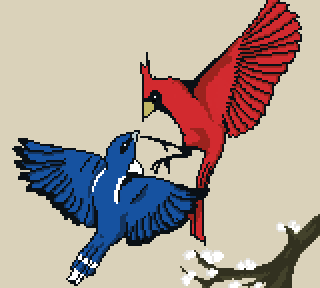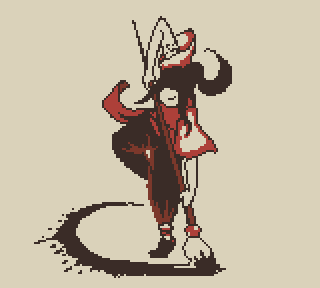Comic Thoughts: Nausicaä of the Valley of the Wind
Today I finished reading the final volume of
Nausicaä of the Valley of the Wind, the manga written and
illustrated by Papa Ghibli himself: Hayao Miyazaki.
It was only recently that I'd learned this Manga existed. Despite
Princess Mononoke being my favourite film since I was 12 (and it
still holds up!), I'd only consider myself a mid-tier Ghibli fan. I've seen
all the major films and am super hyped for the new one that recently
released, but I've passed up 3 separate chances to go to the Ghibli museum,
don't like Totoro, and own no more than 10 pieces of Ghibli paraphernalia
(DVDs excluded).
While the movie version of Nausicaa (I'm dropping the umlaut henceforth) was
already fairly high up on my Ghibli list, what really interested me about
the manga version was learning it was way longer. 7 volumes, to be
exact, with a story that takes us many more places amongst many more
factions than the film.
If you liked what the film had to offer you should absolutely pick this one
up and give it a read. Between Nausicaa the film, Princess Mononoke, and
this manga, I feel like Miyazaki felt a strong need to express his views on
humanity's destruction of the earth through greed and war. Despite this
scathing criticism of humanity, however, he leaves hope through the actions
of the main protagonists.
It's definitely not as clean and tidy as the movie version -- with so many
factions and characters it can get a little confusing, and at times it
definitely gets a little lost in the weeds. The message is loud and clear
throughout, however, and punctuated by a version of Nausicaa that gets her
hands much more dirty and openly questions her own actions and intentions
throughout the story.
Book Thoughts: A Psalm for the Wild-Built
My favorite type of science fiction novels focus on people and societies
instead of the tech. "Speculative anthropology [with robots n'
future stuff]".
One subgenre of this that I've been excited to see explored is "Solarpunk".
This genre veers away from the typically dystopian future outlook to offer a
hopeful vision of the future where humans can live in harmony with
the ecosystem.
Yesterday I finished the audiobook version of
A Psalm for the Wild-Built by Becky Chambers -- a Hugo-winning
solarpunk novella about a tea monk and a robot. I've got mixed feelings
about it, but overall it was a pleasant and relaxing read.
Note: I recommend reading this one instead of listening, as I wasn't fond of
the narrator's choice of voice and emphasis for a lot of the reading.
(Spoilers after the jump)
- Read the rest -
Book Thoughts: The Shadow of the Wind
I finished listening to The Shadow of the Wind by Carlos Ruiz Zafón
the other day. I had originally thought it was some kind of magical fantasy
book, but it was absolutely not that. It was, however, and
excellent read/listen outside of my usual genres and writing style.
The story takes place in Barcelona in the 1940's and 50's as a young boy
seeks to solve the mysteries surrounding the author of his favorite book. As
the story unfolds it becomes a wonderfully captivating tale of murder and
mystery and intrigue, all while we watch the narrator grow up and stumble
through his own life making mistakes along the way.
There is so much emotion in this novel. Barcelona feels alive, the
characters are all messy and passionate and expressive, the events and
storylines that take place are often so illogical but so human in
ways that you don't frequently see in SciFi/Fantasy, and it was a very
refreshing read for that - I had a similar experience when reading East of
Eden in that strange capturing of human messiness that is so often distilled
out of my normal reading.
The author has a line that "Books are a Mirror", that you only see in them
that which you already have inside you. This really struck me, as while I
most definitely learn new things from books all the time, a book like
this truly feels like a mirror. I kept seeing in the story
reflections of my own mistakes and experiences in life, bittersweet
reminders of failed romances and lost friends that elevated the story.
Given the messy nature of the story and the lives the author spins into this
tale, they managed to finish completely cleanly -- they tied up every loose
end and left no questions about any of the characters' fates. I thank them
for that, as I really felt attached to many of the colorful cast.
I really enjoyed this story and how perfectly self-contained it was. I
understand there's some prequels out there, but for now I think I'll let
this one stand on it's own.
Game Thoughts: Chrono Trigger
Long ago as a youth I got a copy of Chrono Trigger included in my
"Final Fantasy Chronicles" PS1 Collection. At the time I knew nothing about
the game, and ended up getting stuck on the Mountain of Woe boss and moving
on to other things. Though I would pick the game up again on various
emulators over the years, I'd never get past the first trip to 600AD due to
short attention span. Eventually the number of times I'd
started the game became it's own barrier to entry, as I dreaded
replaying the beginning again.
It's one of those weird things -- one of the most beloved pixel art JRPGs of
all time, yet I couldn't bring myself to even start it anymore, let
alone finish it. However, recently Chrono Cross got a re-release,
and a new indie game, "Sea of Stars" came out flaunting Chrono Trigger
inspirations. I felt like I owed it to myself to beat the original game to
prepare my pallette for these other titles and finally took down my trophy
DS copy of the game down from its pedestal, booted up my much-loved 3DS, and
beat one of the best JRPGs of all time.
- Read the rest -
Comic Thoughts: Junji Ito (3 titles)
It's been a while since I've read any Junji Ito stuff, despite having loved
Uzumaki and the Amigara Fault (the later turned me into a permanent fan). On
a trip today I picked up 3 of his novels: Remina, Sensor, and
Black Paradox.
Remina didn't do much for me. It lacked any real depth and didn't
give me that twinge of dread I want when reading cosmic horror. It
did have a couple of memorable horrific scenes that were truly
deranged (in the good Junji Ito way), but was overall a disappointment.
I enjoyed Sensor much more. The story beats were more substantial and
it had some really great chapters. There was a bit with bugs that was really
good stuff, and the story had good overall weird vibes to it.
Still, it wasn't great -- I started questioning whether I was just
viewing his stuff through rose-tinted glasses.
However, Black Paradox was fantastic. Really good stuff, twisted in
the right ways, strange as hell and dark. It's the shortest of the three,
but the best by strides. The setup was great, the development was great, and
the characters were interesting.
Black Paradox is a real gem, and definitely belongs on the shelf next to
Uzumaki and Tomie; the other two just get to go there because of
alphabetical ordering.
Book Thoughts: This is How You Lose the Time War
I just finished listening to This is How You Lose the Time War.
It was a very different kind of sci-fi novel. Very abstract, poetic. Loose
on detail and high on feelings, which is a stark contrast to many stories in
the space which are so fixated on hard maths and time paradoxes.
It was honestly a beautiful short story. It plays off modern common
knowledge of sci-fi, hand-waving the nanomachines and time-jumping into the
background so we can focus on the two focal characters as they write letters
to one another and develop a relationship.
As they move from rivals to friends to more, their letters become
increasingly abstract -- the wingbeats of a bee, the shapes of the
year-lines in a felled tree, the protein shapes of a core of apple.
Admittedly, while these feats of steganography managed to imply technical
and artistic feats of nature and technology that were wildly romantic, they
occasionally broke immersion with how absurdly out-of-the-box they got.
I regret having listened to this one rather than reading it, I feel like the
tactility of holding and reading their letters on paper, and treading and
re-treading passages, would have elevated this beyond what the narrators
could do.
All in all I found it a very pleasant and creative piece of sci-fi. I really
enjoyed the intertwining of sci-fi and poetic writing, which is a
combination I don't freqently see in my usual reading.
Book Thoughts: Yumi and the Nightmare Painter
After finishing Frugal Wizard, I launched directly into Sanderson's next
audiobook: Yumi and the Nightmare Painter. In my last post I whined a
bit about how Sanderson should use these books to explore a bit and deviate
from his norm. He didn't do that here, but hot damn if this one
isn't peak Brandon Sanderson.
I was honestly surprised with how good this one turned out. It went in a
couple directions I genuinely didn't expect, he nailed the young romance
(maybe even went a little too manga with that bit), and I just
thoroughly enjoyed myself all the way through.
If it didn't have so many little Cosmere / Hoid references I would go as far
as saying this would be the best "Introduction to Sanderson" book. It's an
excellent standalone(mostly) novel that shows off Sanderson's unique twist
on fantasy / magic at his current writing capacity (vs something earlier
like Elantris). Yes, it's very young-adult, but I was a young adult when I
got captivated by this kind of fantasy storytelling with the Wheel of Time
at 13.
Sanderson used a lot of Japanese / Korean influence when designing this
world, and managed to do it in a way that leaned on the imagery and language
semantics of the cultures without stepping into stereotypes. Honestly it was
quite clever - by evoking the Neo-Tokyo and ancient korea that we so
commonly see in media, then deviating just enough, he managed to
build a novel fantasy setting in way less words than would otherwise be
needed.
If the last book was vanilla soft serve, this one was a hearty home-cooked
meal with a touch of asian fusion. Comfy, just a tiny bit adventurous, very
satisfying.
I want to add an extra note about how much I've been appreciating
Sanderson's post-scripts in these books. Having the author openly talk about
how different media he's enjoyed influenced how he builds his worlds and
stories is very validating. It's something I do a lot when building stories
and games in my head, and I've always felt slightly ashamed that my ideas
are always just iterations, combinations, or extensions of ideas from other
sources. It's one thing to hear an author talk about inspirations in
interviews, and quite something else for them to be willing to openly stamp
those sources of inspiration directly into their work, and even have the
narrator read them out loud in the audiobook version.
Book Thoughts: Frugal Wizard's Handbook
Today I finished my audiobook copy of
The Frugal Wizard's Handbook for Surviving Medieval England, by
Brandon Sanderson.
(Big spoilers warning)
- Read the rest -
Game Thoughts: The Case of the Golden Idol
I beat The Case of the Golden Idol the other day, and you should
absolutely purchase and play it. It's fantastic.
The gnarly pixel visuals, the absurd scenarios, and the wonderful
environmental storytelling are all top-notch. The puzzles and related
mechanics are perfectly executed, and the way each story tied into
the next was thoroughly satisfying.
I must have audibly said "OHHH" out loud half a dozen times over the course
of the ~100 minutes it took to finish from start to epilogue, as the puzzles
and point-and-click environments are designed with many revelations and
"everything makes sense now" moments.
If you liked Obra Dinn, this is a mandatory purchase. (You haven't played
Obra Dinn that's also a mandatory purchase FYI).
The only complaint I have is it's too short. That's not a complaint that
takes away from the game, I just wanted more. There's a DLC out but
it's not cheap, and while I'm confident it will be worth the money I'm going
to wait and see if they release more DLC first so I can get (and play) them
all at once. (I want another meal, not snacks!)
Also, the game was built with Godot, so that's a bonus cool fact!
Game Thoughts: Tunic
About a half hour ago I beat the "bad" ending of Tunic, a cute
snes-zelda-esque game with a cute fox that gets way too hard. (mild spoilers)
I'm not sure I liked this game very much as a whole. There was about a 2
hour window window between the "oh this is just a snes zelda clone" and "ok
I remember why that's not a bad thing", and then a nice handful of hours
where I really enjoyed the game and what it was offering in terms of lore
and gameplay... then the game decided it was time to get serious and cranked
the difficulty to 200.
I have a very real skill ceiling when it comes to action-y parts of games,
and I have neither the time nor the patience to "git gud". "Souls" games are
essentially a watch-only thing for me, and Tunic delved just a little too
far into that realm after a point. If you like dodge-rolling and dying a lot
and re-treading then great; if you don't it can get extremely
tiresome extremely quickly.
Thankfully, the game comes with some accessibility settings that make it
easier. These range from disabling stamina depletion (allowing for infinite
shield and dodge), to completely disabling death. I am fully willing to
admit that I got to a point where I just flipped on invincibility so I could
cruise through the rest of game --
and even then there was an enemy I had trouble beating.
A lot of wording online says to go into Tunic blind, comparing it to things
like The Outer Wild. While the game has some mysterious puzzles and
interesting revelations as you peel back the layers, it wasn't that for me.
Outer wilds left me breathless, while Tunic just left me irritated.
After getting the bad ending I did a bit of research into getting the good
one, and I was honestly annoyed even reading the solutions, so
there was no way I was going to actively dothem. I just watched the
other ending online; I think the kind of late-game and meta- puzzles that
Tunic offers is for a different breed of puzzle-enjoyer than I.
I will say, the whole manual-page-collecting mechanic was very endearing and
cleverly implemented, and the game looked and played wonderfully, the dark
elements were unexpected and great. There was a lot that I liked in Tunic,
but I don't think the good outweighed the frustrating for me.


